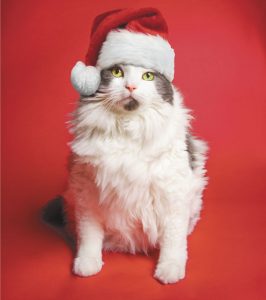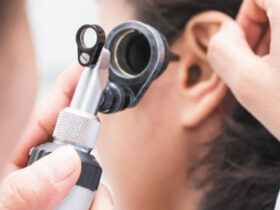 There are many potential dangers to cats at Christmas time, from food that can harm them to common indoor plants. One potential risk to cats is tinsel used to decorate Christmas trees and mantels. Tinsel comes in types, garland tinsel and long strands of tinsel, known as angel hair or lametta tinsel.
There are many potential dangers to cats at Christmas time, from food that can harm them to common indoor plants. One potential risk to cats is tinsel used to decorate Christmas trees and mantels. Tinsel comes in types, garland tinsel and long strands of tinsel, known as angel hair or lametta tinsel.
Tinsel is dangerous to cats
The long strands of angel hair/lametta tinsel can lead to a life-threatening condition known as intussusception (pronounced in-tuh-suh-sep-shun) or telescoping of the intestines. When a linear foreign body (a foreign body that is long and thin, such as a piece of wool, ribbon, dental floss, string, carpet, pantyhose, sewing thread, or in this case, tinsel) is ingested, one part of it can become lodged, often at the base of the tongue, the esophagus, or the opening of the stomach (pylorus), which acts as an anchor. The other part is propelled along the GI tract by peristalsis, which is the wave-like contraction of the GI tract to push food along until it becomes taut. The GI tract below the lodged tinsel will creep up the trailing part of the tinsel and become plicated (folded).
The long thread can cut into the bunched-up intestines leading to life-threatening peritonitis (Inflammation of the membrane which lines the abdominal wall and covers the abdominal organs) or cutting off blood supply which causes the tissue to die. Symptoms of Intussusception include vomiting, diarrhea, lethargy, abdominal pain, loss of appetite, drooling, dehydration, and pawing at the mouth.
Diagnosis:
The veterinarian will perform a physical examination on the cat and obtain a medical history from you. During the examination, the veterinarian may be able to feel the accordion-like plicated intestines. Baseline tests such as biochemical profile, complete blood count, and urinalysis to evaluate the overall health of the cat and to rule out other causes of vomiting.
An x-ray may or may not show the tinsel, but can reveal bunching up of the intestines as well as abnormal gas patterns. If an x-ray is inconclusive the veterinarian may perform an ultrasound, which provides a 3-dimensional view of the intestines. This can help to evaluate the location and the length of the foreign body and evaluate the intestines. Barium contrast study to look for telescoping of the intestines. This involves feeding barium to your cat which coats the lining of the intestines, then performing an x-ray.
Treatment:
If the tinsel is wrapped around the tongue, the veterinarian may opt to snip it and monitor the cat in a hospital setting to see if it passes out of the cat. This avoids surgery but comes with risks. Surgery (enterotomy) to remove the tinsel involves placing the cat under general anesthesia and making one or several incisions in the abdomen to carefully remove it.
If any tissue has been damaged or died, surgical resection will be necessary to remove the affected tissue. The cat will be closely monitored in the hospital post-surgery. Intravenous fluids, antibiotics, and painkillers will be administered during this time. Most cats will be well enough to go home 24-72 hours after surgery.
Other Holiday Dangers to Cats:
Hanging ornaments
From a cat’s perspective, low-hanging ornaments on a tree are just begging to be swatted at and then played with on the floor. If there are any low-hanging ornaments on your client’s tree, be sure that they are made of materials that a cat can’t chew or otherwise destroy and ingest.
Poisonous plants
While poinsettias have long been believed to be extremely dangerous for cats, the danger they pose when ingested by a cat (stomach upset) is not as bad as some other common holiday plants, such as mistletoe, pine tree needles, amaryllis lilies, red azaleas, and paperwhites. If your home has festive plants, make sure they are somewhere a cat won’t be tempted to chew on them. If you are unsure if a plant is poisonous, or are concerned that your cat may have eaten something dangerous, call the ASPCA’s animal poison control center (888-426-4435) for more information.
Candles
A cat probably isn’t going to be too intrigued by the candle itself, but a wayward swishing tail can easily knock a candle over, causing a host of problems. Candles should be out of reach, and make sure to stay vigilant around lit candles.
Holiday foods
While it may be tempting to give a cat just a nibble of turkey or other holiday food, encourage you to resist the urge. Rich foods can upset a cat’s digestive system, which could produce unpleasant effects. Also, cats should never be given any type of bone, as they can splinter and cause internal injuries to a cat.
Stress
Cats like routine and predictability, so when their schedules or environments change, they can become upset. If you are planning on having holiday guests and your cat isn’t used to entertaining, create a safe, quiet space away from the action where the cat can have some peace. Be sure to have food, water, and a litter box available in this secluded area so your cat can be comfortable away from your gathering.
Animal Oasis Veterinary Hospital in Naples offers the most up to date and progressive veterinary services for your pets. Ranging from laser surgery, ultrasound, dental X-rays, radiology, full pharmacy, and in house diagnostics, Animal Oasis Veterinary Hospital provides your pets with the necessary options for treatment.
Animal Oasis Veterinary Hospital
239-431-7980
www.aovethospital.com










